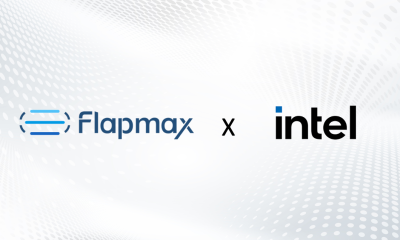Afripreneur
How This EdTech CEO Is Helping Africans Access Premium Tech Skills Relevant For The Future Of Work
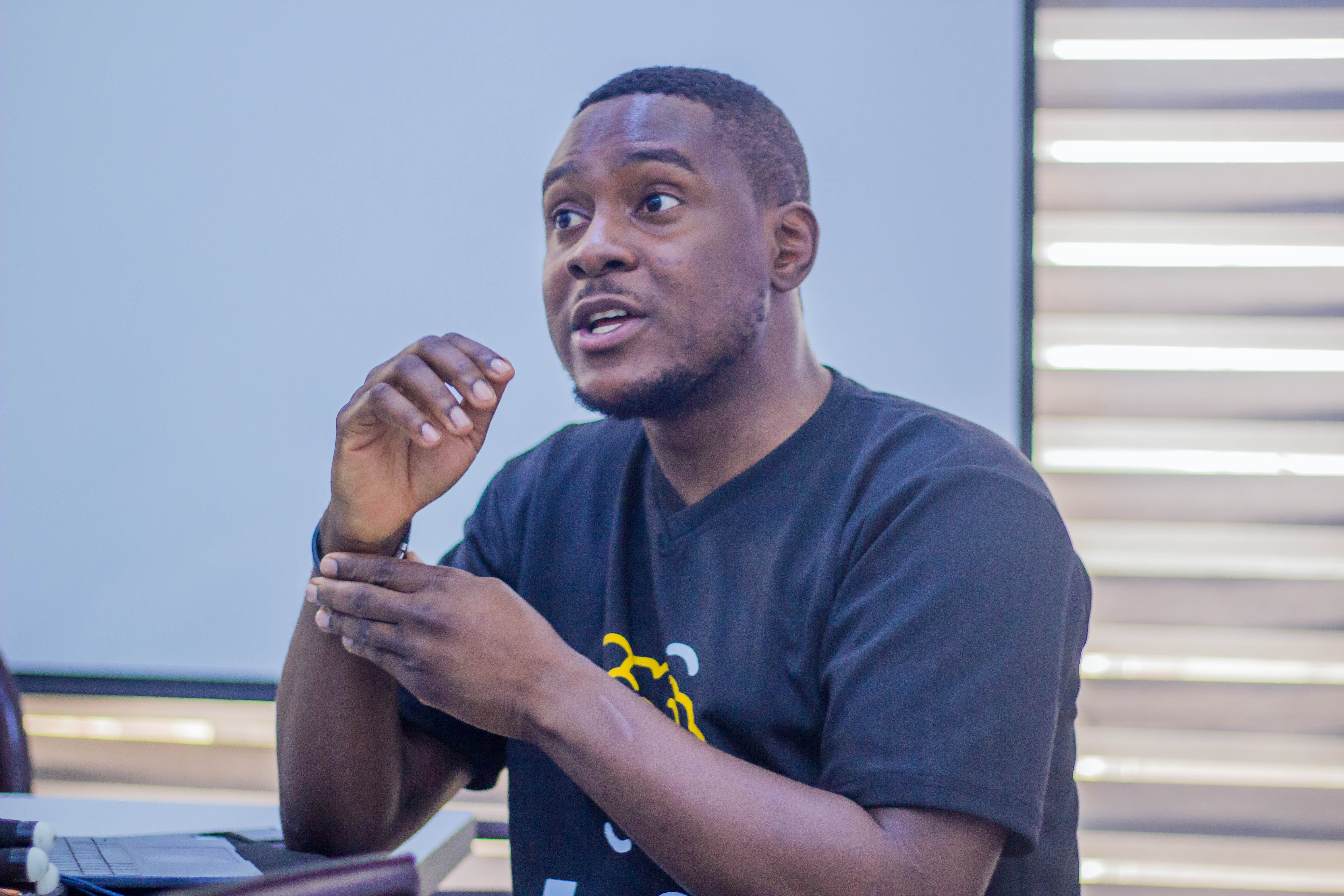
Eyitayo Ogunmola is the CEO of Utiva, a leading tech education startup in sub-saharan Africa and a technology education entrepreneur with more than 9 years experience in Product management, international development And technology leadership. In this exclusive interview with Alaba Ayinuola of Business Africa Online, He talked about his entrepreneurship journey, the Utiva brand and how they are helping people transition into roles in the technology industry in Nigeria and Africa. Excerpts.
Alaba: Tell us about Utiva and the role you play?
Eyitayo: Well, Utiva is a one-stop-shop for everything technology education. What we do is help Africans learn premium technology skills and then create paths to helping people transition into roles in the technology industry. If you think about this inform of a mission, I’d say that ours is to help Africans participate in the digital economy and benefit from the value that
digitalization gives to us as a continent.
One of the ways to think about this is to think about the population of the African youths.
According to research, by 2030 Africa will have one of the largest populations of young people that are ready to work in the job market, about 600,000,000 of them. And what we do at Utiva is to lower the barrier to entry and learning for so many young Africans that want to acquire technical skills. And also help them access new jobs.
Within 2 years, we have developed learning programs in some very specific areas of digital skill training. From Product Management to Product design to Data Analytics to Artificial intelligence to Digital Marketing. Our focus is to make the learning programs so interesting and attractive for people to participate. That is pretty much what we do at Utiva.

Now talking about my own role, I am the Chief Executive Officer, so what I do is to lead the team, lead the practice, and to champion the organization’s policy the way the organization is structured. So I typically will report to the board, I am the person that pursues the investors, also the one cheer leading and helping the stakeholders to get attracted to the brand Utiva.
Alaba: What was your startup capital and how were you able to raise it?
Eyitayo: Now the interesting thing about Utiva is that we bootstrapped from the very beginning. We didn’t raise a dime. I pretty much used my own personal savings to run Utiva from day one. And as a social enterprise, I will say that we have benefited so much from impact investing or social impact financing in the form of grants to subsidise our training.
So Utiva has been a bootstrapper from the beginning, we so much believe in bootstrapping to a point before we start using other people’s money to run the organization.
Alaba: What are the challenges, competition and how are you overcoming them?
Eyitayo: Well in terms of competition, I will say that we pretty much do not always see ourselves as competitors in the education space, we love to see ourselves as complementors. But there are other amazing companies and organizations that are playing in our space. There are organizations that are niched and are focused on different areas of technology education training, so I may not be able to mention names here but I will say that there are great organizations that are focused on training in programs. There are organizations that do not do training, they just connect people to the job market, there are organizations that are focused on digital skills training, some are focused on providing internships to people that have been trained.
So what we do which is like the competitive advantage that we have is that we are a one-stop shop for everything technology skill training. From Data to Product to Design to Digital Marketing to Growth Hacking to Artificial Intelligence and this is a value proposition that makes our students get very attracted to Utiva. Because they trust us and the trust is pretty much built around the fact that we have built several digital schools and they know that yes we really know what we are doing.
In terms of the way we also overcome the competition, we built Utiva to be very affordable. We lower the barrier to entry for Africans and we do not believe that you need to break the bank to learn a technology skill and that is one of the areas of the competitive advantages that we have. Another one for us is the post-training values that we offer our students.
We have built 3 different models around our post training value. One is the virtual internship. What this means is that at the end of every training program, you have the opportunity to work on multiple projects in the form of virtual internship. The second one is access to job opportunities. Our students gain access to different job opportunities because we have a large network of employers that are hiring through us. And the third one which I consider to be an awesome value is the fact that we are lowering the barrier to entry for those that really need help, speaking of people with disability. We actually just launched a training program that gives 500 people with disability an opportunity to learn digital skills.
These are some of the many values that we offer that makes people want to be a part of our learning program.
Alaba: How does your organization measure it’s the impact?
Eyitayo: So, there are three major ways of measuring impact for us and we are quite very intentional about the way we measure impact. So think about it this way, we measure impact, first by measuring how we are helping you as a student close the knowledge gap. So from the beginning, we want to know what you know, then at the end of the learning program we want to know what you know. So we see the knowledge gap and how we have been able to close it.
The second way we are measuring impact is how you have been able to take the knowledge from the class to practice and we do that within the 3 months virtual internship, we look at how our students have been studying using multiple analytical strategy to evaluate how our students are working on multiple projects and how they are able to juggle these projects and most importantly how they are able to translate what they have learned from the class environment to the real work environment through that virtual internship.
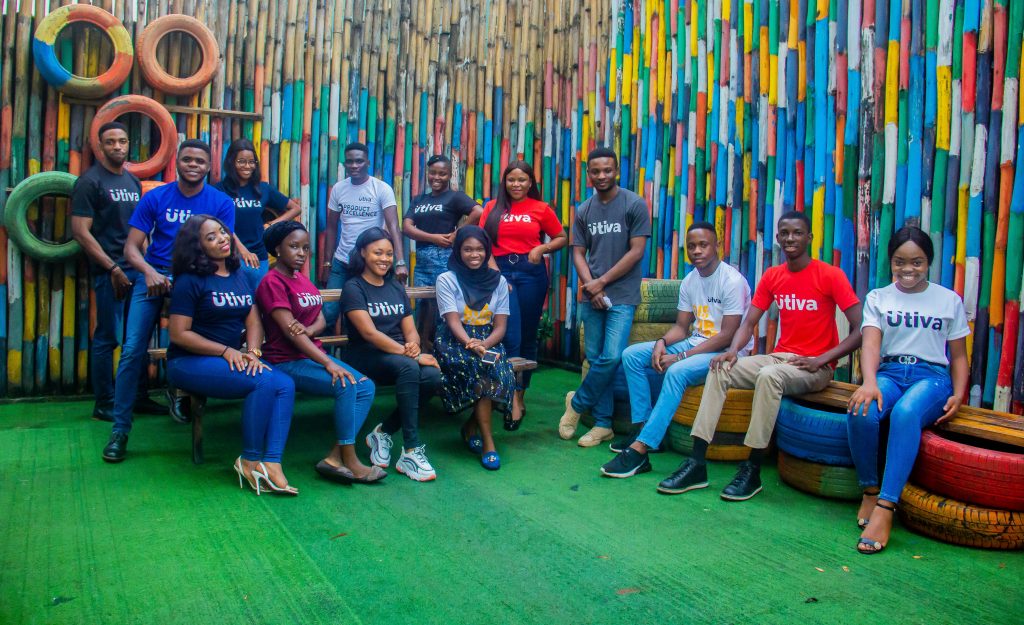
The third one is what employers are saying about our students, that’s like ultimate value. We currently have a 65% transition rate into new jobs and beyond the transition rate, we also look at how employers are getting satisfied with the quality of talents that are passing through Utiva because it is not enough for you to transition, we also need to know how satisfied these employers are with our students.
So, these are the ways we are measuring impact. How you are transitioning to new jobs and the values that employers are getting from the quality of students that pass through our programs.
Alaba: What is the future for Utiva and what steps are you taking in achieving them?
Eyitayo: I am going to be very brief about the future for Utiva because for us at Utiva, we are still in the execution phase. Our focus today is to deliver quality training for our students. But the future of Utiva is to help other educators become successful. The education space is an amazing space to play in and one of the things that we are doing is that we are helping every other educator to become successful in the future.
Beyond being a company that offers quality training, and helping young Africans transition into new jobs, we also want to help other educators to become better so that we can scale the value for Africans, I mean we can’t do it all, how do we even train 600,000,000 young people alone? So we want to replicate ourselves in other educators. That is the future for us.
Alaba: How is your business contributing to the development of the educational sector in Nigeria and Africa?
Eyitayo: Yes, yes! So let me explain a little bit about that. Our contribution is to replicate ourselves, so the way we think about this is that we want to be successful, we want to build successful models, we want to build a successful learning approach. We want to be successful and we want to help other educators to be successful. We want to help other educators to learn the right andragogy and the right pedagogy to become successful.
For us at Utiva, success is built around how much we are helping other educators in the educational sector to become successful. It is in view of this that we launched a mini project which is like a startup incubator for educators. And right now we have about 10 of them that we are coaching and mentoring and helping to access funding abroad just to scale success and that is the way we are thinking about that.
Alaba: How is the government policy supporting startups and entrepreneurs in Nigeria?
Eyitayo: I would say that there are two ways to think about this right, there are so many government policies out there that are structured around providing support to lots of entrepreneurs in Africa, so I will give you an instance, the creative industry loan. The creative industry loan was a CBN initiative that was built to support Nigerian startups. Let me give you another example, the Vice President launched multiple projects to attract investors and also to make the entrepreneurial ecosystem quite very attractive.
However, the policy is not the challenge, what the real challenge is the access. Because most of these policies that the government put in place are there and also the programmatic intervention that the government put in place are there. Where the problem lies is that most African or most Nigerian entrepreneurs do not have the capacity to access some of these opportunities. You know the CBN interest rate policy supports startups, supports entrepreneurs. They are there, but Nigerian entrepreneurs need to be supported in such a way that when these policies are enacted, the barriers to benefiting from these policies are lowered so that we can access them.
Also, the government needs to create an opportunity to talk to entrepreneurs. Beyond just creating policies here and there, the government needs t o talk to entrepreneurs every time. The more you talk to entrepreneurs, the more you are able to understand what works for them and create structures that can really support them.
Alaba: What advice would you give potential entrepreneurs who intend to start a business or invest in Africa?
Eyitayo: The Advice I would give is to start. Start fast and learn fast. I mean you cannot over-prepare for entrepreneurship in Nigeria because it is a totally different ball game. But start and learn very fast. That is the advice I will give, and I would say that think more global, build a more global product. It’s ok to build products for a Nigerian market, but build a global product so that you can benefit from the global dynamics.
Alaba: How does it feel to be an African entrepreneur?
Eyitayo: I think it’s a mixed feeling. Sometimes you are excited because of the opportunity, because of the market, because there are problems and where there are problems there are opportunities
and that is exciting. Then another one is like as an African entrepreneur, you are fighting too many unnecessary battles. We can really build a successful or a super successful African entrepreneurship ecosystem or build a super successful business landscape for the African market if African entrepreneurs do not always have to fight unnecessary battles.
Like you fight battles with electricity, you fight battles with bad roads, you fight battles with bad employees, taxation. You are fighting multiple battles that the government is supposed to fight for you so that you can focus on your core which is building business.
Alaba: How do you relax and what books do you read?
Eyitayo: I travel a lot. Although COVID-19 has really taken that opportunity away from me, because travelling is my thing. Then I read a lot of books around internal navigation, around leadership. That’s one of the things I have been studying so much. Beyond just the motivational leadership books, I read some core books around internal navigation. So one of the areas of books that I have been exposing myself to is biography. I have been reading the biography of some super successful entrepreneurs and I will recommend that other entrepreneurs also start to study biographies of other super successful entrepreneurs. Thank you!
Also Read Pineapple TV: Delivering Positive Impact And Instilling African Culture – Carl Raccah
P R O F I L E
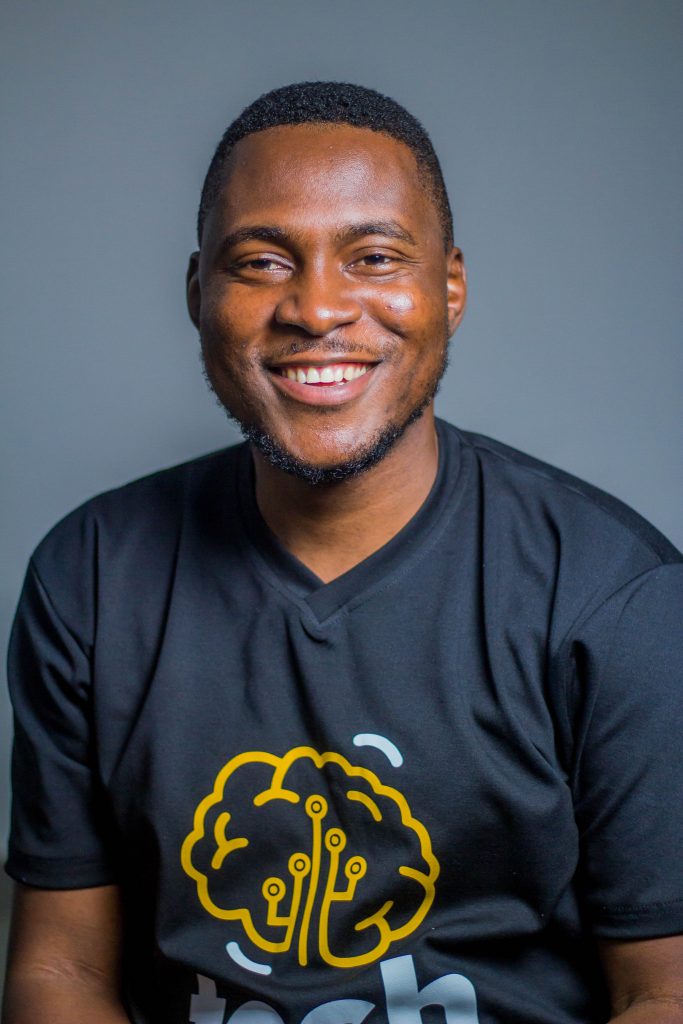
Eyitayo Ogunmola is a Technology Education Entrepreneur with more than 9 years experience in Product management, international development and technology leadership. He has lived and worked in 4 countries and also led at the VP level of a consulting company.
Eyitayo founded Utiva, a leading technology Education company in Sub-Saharan Africa that helps Africans learn tech skills relevant for the future of work. Prior to Utiva, He worked in the International development sector, working on USAID funded tech projects. And also founded PM Hub, a boutique for product development.
He holds a Masters degree in business strategy, leadership and change from Heriot-Watt University. He is a MIT Solve Entrepreneur, 2020 Facebook Accelerator Leader, Halcyon Incubator Fellow, Global Good Funds Fellow; Chevening Scholar, Atlas Corps Fellow, 2019 Unleash Talent.
In 2019, Eyitayo was nominated for Future Awards Africa 2019 under the Education category and most recently is his nomination for the Tech Times Africa Awards under the CEO category.
Afripreneur
Oluchi Anoruo on building SmartPharm and addressing access to healthcare products

Pharmacist Oluchi Anoruo is a visionary healthcare leader and a passionate advocate for global health and well-being. As the Co-founder and CEO of SmartPharm, Oluchi has leveraged her extensive experience to drive innovative solutions in the pharmaceutical industry. Her over six years of practice as a pharmacist have equipped her with a deep understanding of clinical practice, pharmaceutical management, and patient care. Under her leadership, SmartPharm is at the forefront of transforming access to healthcare products, ensuring better health outcomes for patients. In this interview with Alaba Ayinuola of Business Africa Online (BAO), Oluchi shares her entrepreneurship journey, advocacy for global health and well being and how she is addressing access to healthcare products in Nigeria with SmartPharm. Excerpts.
Alaba: Could you briefly share your entrepreneurial journey, and what inspired you to start a pharmacy aggregator startup?
Oluchi: My journey as a founder started in 2017 when I lost my aunt due to the lack of access to an emergency drug needed to reduce the swelling in her brain caused by head trauma she sustained in a car accident. Her death was preventable. This painful experience exposed me to the bottlenecks patients faced in accessing vital medications and made me more intentional as a pharmacist to help patients gain easy access to vital medications. Leveraging on the influence I had within my professional circle, in 2018, I created an e-directory of some Pharmacies in Owerri, Imo State on Google sheet which I regularly updated. This e-directory was extremely useful in quickly finding the Pharmacy in the community to visit for a particular medication.
Having no entrepreneurial or tech skills, I embarked on numerous self-development journeys that enabled me to gain the required skills. I enrolled in online courses on EDx for entrepreneurship. During this time (2019), I got selected by Circuit Pointe a women focused non-profit organization for a 5 months web development course. On completion, I equally got awarded the fully funded Andela/Google/Pluralsight scholarship on android development. It was during this program I got coaching that helped me to pursue product design as it was more relatable , human centred and gave me room to hone my problem solving skills. I enrolled in Pixels online design school, graduated top of my class and got a scholarship sponsored by UK tech hub to further develop my product design skills. During this time, I registered SmartPharm as a business name.
I went on to work remotely as a contract product designer for various healthtech companies while building SmartPharm and also working as a community pharmacist. As a testament to my academic, professional and social achievements, I enrolled at the Nigerian University of Technology and Management (NUTM) in September 2021 as one of the selected sixty scholars for a fully funded one-year postgraduate program on tackling African perennial challenges. During my time in NUTM I was able to develop the first MVP of SmartPharm with the help of some colleagues who I parted ways with after the program. I also met one of my co-founders at NUTM. My co-founders and I have gone on ahead to achieve great milestones and we are positioning to achieve more towards our goal of changing the way Nigerians access their healthcare products.
Alaba: What specific problems does your platform solve?
Oluchi: We are addressing the poor and untimely access to healthcare products (medication, medical devices and pharmaceutical cosmetics) for persons who are in need of them.
Alaba: How does your platform aggregate pharmacy services, and what benefits do users gain?
Oluchi: We typically work with and onboard registered community pharmacies. Our users get to enjoy discounted prices offered in partnership with our partner pharmacies.
Alaba: Can you walk us through your platform’s key features and user experience?
Oluchi: Using smartpharm.net is pretty easy. Our platform is a webapp for now and you can find and order your health products in 3 easy steps – search, order and receive(door delivery or you can pick it up yourself.)
We pride ourselves in providing timely access to your medication and also delivery. On the average, we typically find and deliver within an hour (within Lagos). We are in Lagos for now.
Alaba: How do you ensure competitive pricing and discounts for users?
Oluchi: We are very customer centric and we are always on the lookout for our customers. Because we have a lot of pharmacies in our network, our customers get to choose the best price to buy their health products.
Alaba: What strategies do you employ to retain users and encourage repeat business?
Oluchi: It’s simple- we put the customers/users first.
Alaba: How has your entrepreneurial journey impacted your personal life and values?
Oluchi: Being an entrepreneur has given me the opportunity to make impact by contributing to reducing avoidable deaths due to poor and untimely access to health products and also instil values that made me over the years such as integrity, fair hearing, respect, empathy and discipline into my business through the way we treat people who work for us and they people we serve.
Alaba: Lastly, What role do you see pharmacy aggregators playing in improving healthcare outcomes?
Oluchi: I strongly believe that the adoption of tech enabled solutions into the healthtech (pharmacy tech space), will completely revolutionize the pharmacy space in the nearest future culminating in enhancing the way people access their health products subsequently helping to improve people’s health outcome. If Mr A can have constant access to affordable health products without the need to worry about his next refills or where to get his next refills, then he will be able to stay faithful to taking his medications with all things being equal.
B I O G R A P H Y
Pharmacist Oluchi Anoruo is a visionary healthcare leader and a passionate advocate for global health and well-being. With a robust educational background that includes a Bachelor of Pharmacy from the University of Uyo and postgraduate studies at the Nigerian University of Technology and Management, Oluchi combines academic excellence with practical expertise. Her dedication to lifelong learning is evident in her numerous certifications, including notably Jim Leech Fellowship and Ashoka in Social Innovation in Health and Wellness.
As the Co-founder and CEO of SmartPharm, Oluchi has leveraged her extensive experience to drive innovative solutions in the pharmaceutical industry. Her over six years of practice as a pharmacist have equipped her with a deep understanding of clinical practice, pharmaceutical management, and patient care. Under her leadership, SmartPharm is at the forefront of transforming access to healthcare products, ensuring better health outcomes for patients.
Afripreneur
Redefining Real Estate Marketing: An Interview with Imelda Usoro Olaoye, Founder of Thinkmint

Imelda Usoro Olaoye is a seasoned sales and marketing leader who has worked in various sectors of the economy. Imelda is an expert in real estate, marketing consultancy, using new tools, technology and methods having successfully launched and run an award winning real estate digital marketing firm with branches in Lagos, Nigeria and Estonia, Europe; Thinkmint Nigeria and Europe. She started her real estate/home sector marketing career in Clarions UK after which she joined PropertyPro.ng where she rose to lead the company’s media, real estate transactions and exhibitions team. In this exclusive interview with Alaba Ayinuola of Business Africa Online (BAO), Imelda shares her entrepreneurship journey with a passion for creating solutions that meet people’s needs and the real estate market in Nigeria. Excerpts.
Alaba: Could you briefly share your entrepreneurship journey, and what inspired you to start a real estate deals marketing company?
Imelda: My entrepreneurship journey began with a passion for creating solutions that connect people with the resources they need. While working in media, exhibitions, and events, especially as the Head of Transactions, Media/Exhibitions and organising the African Real Estate Discussions & Awards (AFRECA) at Tolet.com.ng ; now PropertyPro.ng, I recognized a significant gap in the real estate market: the need for a platform that simplifies transactions and bridges the gap between buyers, sellers, and industry professionals. This inspired me to found Thinkmint, a real estate marketing company. It was born out of the desire to provide a seamless experience for clients and to use technology as a tool for creating accessibility and efficiency in real estate marketing.
Alaba: Can you share your experience in real estate marketing and notable achievements?
Imelda: Over the years, I’ve built a robust experience in real estate marketing by managing high-value transactions and leading teams to deliver measurable results. Notably, I spearheaded the launch of Real|Life Magazine, an innovative publication showcasing real estate opportunities, developed an online marketplace, www.thinkmint.ng/buyrealestate, which simplifies the discovery and purchase of offplan properties with No Agency Fees, Flexible Payment Plans and Low Entry Fees. Additionally, through events like the Real Estate Discussions and Awards (REDA), I’ve fostered industry networking and thought leadership, which have contributed to the visibility and credibility of Thinkmint in the real estate sector. We recently also launched a branch in Estonia, Europe to allow for ease of transactions for Nigerians in Diaspora.
Alaba: What services do you offer, and how do you differentiate your company from other platforms?
Imelda: Our services include real estate marketing, lead generation, content creation, and event management tailored specifically to the property sector. What sets us apart is our focus on integrating cutting-edge digital tools with traditional marketing techniques. We offer personalized solutions for clients, leveraging data analytics to optimize campaigns and drive results. Additionally, our platforms, including Real|Life Magazine and www.thinkmint.ng/buyrealestate, provide a unique blend of informative content and actionable opportunities, creating a comprehensive resource for the real estate market, with a focus on offplan properties.
Alaba: What marketing strategies do you find most effective for real estate deals, and how do you leverage technology in your marketing efforts?
Imelda: Digital marketing has proven to be the most effective strategy. We rely heavily on SEO, targeted social media campaigns, and email marketing to generate leads and close deals. Technology plays a crucial role in our operations—we use analytics tools to track campaign performance, understand customer behaviour, and refine our strategies. We also utilize CRM systems to manage client relationships effectively and online marketplaces to streamline property listings and inquiries.
Alaba: What trends do you see shaping the real estate industry in Nigeria?
Imelda: The industry is rapidly embracing technology, with the rise of online property listings and virtual tours gaining traction. There is also a growing interest in eco-friendly developments and smart homes, reflecting global trends. Additionally, flexible payment plans and increased involvement in public-private partnerships are helping to address housing deficits. As the market evolves, I see technology continuing to drive transparency and efficiency in real estate transactions.
Alaba: What inspired you to create a business women’s hub, and how do you aim to empower women in business?
Imelda: The platform Business Women Hub is a non-profit organization inspired by my belief in the power of collaboration and mentorship. Women often face unique challenges in business, including limited access to resources and networks. The hub serves as a platform to connect women entrepreneurs, provide educational resources, and create opportunities for collaboration and growth. Through workshops, networking events, and mentorship programs, we aim to equip women with the tools and support they need to thrive in their ventures. Business Women Hub specifically caters for women within their first five years in business and has grown to have over 1500 registered businesses located in Nigeria , South Africa , Kenya , United Kingdom, Canada , New Zealand, Australia & USA.
Alaba: What challenges do you see women facing in business, and how do you address them?
Imelda: Women often face challenges such as access to funding, balancing work-life responsibilities, and overcoming societal biases. To address these issues, I advocate for policies and programs that provide financial support and promote gender equity. Through the Business Women’s Hub, we create a supportive community where women can share experiences, learn from one another, and gain confidence to navigate these challenges.
Alaba: Lastly, what advice would you give to aspiring entrepreneurs and businesswomen?
Imelda: My advice is to stay resilient, consistent, embrace continuous learning, and never underestimate the value of networking. Build a strong support system and seek mentorship from those who have walked the path before you. Also, be open to innovation and leverage technology to create solutions that stand out. Most importantly, believe in yourself, and your vision—success often starts with a mindset of possibility.
B I O G R A P H Y
Imelda Usoro Olaoye is a seasoned sales and marketing leader who has worked in various sectors of the economy. Imelda is an expert in real estate, marketing consultancy, using new tools , technology & methods having successfully launched and run an award winning real estate digital marketing firm with branches in Lagos, Nigeria and Estonia, Europe ; Thinkmint Nigeria and Europe.
She started her real estate/home sector marketing career in Clarions UK after which she joined PropertyPro.ng where she rose to lead the company’s media, real estate transactions and exhibitions team. Prior to this she had worked in the banking and pharmaceutical industry.
A graduate of the University of Port- Harcourt, she has honed her skills in digital marketing, PR & advertising and business practice from the Edinburgh Business School.
Imelda is a member of the International Real Estate Federation, FIABCI. She is also the Founder of Business Women Hub, a nonprofit organization dedicated to the growth of female-owned businesses , especially within their first five years of existence, and 1303 DSylva Events.
Apart from being an entrepreneur, she is a very passionate business growth manager, an award winning real estate consultant and philanthropist.
Afripreneur
Exclusive: Meet the founders building AI tools for education in Africa

Akpan Emmanuel and Uche Nwaobi are the Co-founders of International Community for Educational Technology – ICEDT makers of Ai Teacha, a teaching app that has an engaging and interactive experience for both educators and learners. As pioneers in the educational technology sphere, Akpan and Uche understand the evolving needs of teachers. They are on a mission to empower educators with tools that transcend traditional boundaries. In this exclusive interview with Alaba Ayinuola of Business Africa Online (BAO), Akpan and Uche share their journey and why they are committed to reshaping the landscape of teaching and learning through cutting-edge artificial intelligence. Excerpts.
Alaba: What inspired you to start an EdTech company focused on Africa?
Emmanuel: My inspiration came from witnessing the challenges educators and students face across Africa, particularly in underserved communities. Through initiatives like CS First Lagos Edu Consultant and Code Nigeria Project, I saw how technology could transform education by bridging gaps in access and quality. AI Teacha was born out of a desire to amplify this impact by empowering educators with AI-driven tools that reduce their workload, enhance student engagement, and improve learning outcomes. The platform represents my vision of using technology to make education accessible and equitable for all.
Alaba: Could you briefly share your personal experience with education in Africa and how it shaped your vision?
Uche: Having spent over 25 years in the classroom, I’ve experienced the daily challenges teachers face: overwhelming workloads, limited resources, and difficulty integrating technology into teaching. As a Microsoft Innovative Educator Master Trainer and TeachSDGs Ambassador, I’ve witnessed how transformative technology can be when used effectively. AI Teacha is my way of scaling those solutions. By combining local insights with global best practices, the platform addresses critical gaps, making it easier for educators to provide engaging and impactful lessons.
Alaba: What specific problems does your platform solve for African learners?
Emmanuel & Uche: AI Teacha solves several pressing issues;
Overburdened Educators: Teachers often spend countless hours on administrative tasks. AI Teacha automates processes like lesson planning and assessment creation, giving them more time to focus on teaching.
Resource Constraints: Many schools lack quality teaching materials. Our platform provides AI-driven tools that help create lesson aids, activities, and personalized learning resources. Educational Equity: Students in underserved regions often have limited access to engaging and inclusive learning experiences. AI Teacha bridges this gap by offering affordable, accessible tools that cater to diverse learning styles.
Alaba: Can you walk us through your platform’s key features and benefits?
Emmanuel & Uche: AI Teacha offers a comprehensive suite of AI-powered tools designed to simplify teaching and improve student engagement:
Lesson Plan Generator: Automates lesson planning, saving educators significant time.
Assessment Generator: Provides customizable assessments tailored to student needs.
Visual Aid Generator: Enhances classroom learning with interactive visuals. Text-to-Audio Conversion: Supports auditory learners by converting text into audio resources.
Activity Generator: Creates engaging activities to boost classroom participation. These features reduce workload by up to 80%, making teaching more efficient and impactful while ensuring every student receives a high-quality education.
Alaba: How do you envision the future of learning in Africa, and what role does your company play?
Emmanuel: I envision an Africa where technology eliminates barriers to education, enabling every child to access high-quality learning opportunities. AI Teacha will play a critical role in this future by equipping educators with tools to create personalized, engaging, and effective learning experiences. Our platform empowers teachers to reimagine their classrooms and inspires students to love learning.
Alaba: How do you measure the impact of your platform on learning outcomes?
Uche: We measure our impact through metrics like time saved by educators, improved student performance, and engagement rates on the platform. Additionally, we gather feedback from educators and collaborate with schools and education ministries to track progress. These insights help us refine our tools and ensure that AI Teacha continues to meet the needs of teachers and students.
Alaba: What have been the biggest challenges you’ve faced as an EdTech entrepreneur in Africa?
Emmanuel & Uche: Infrastructure Challenges: Limited internet connectivity in rural areas makes it difficult to scale technology solutions widely. Adoption Barriers: Introducing educators to new technologies requires significant training and awareness efforts.
Funding: Scaling AI Teacha in underserved regions while keeping it affordable has been challenging, but partnerships with schools, governments, and NGOs are helping us overcome these obstacles. Despite these challenges, our shared passion for transforming education keeps us focused and persistent.
Alaba: Lastly, what advice would you give to aspiring EdTech entrepreneurs? Both Founders: Emmanuel: Focus on solving real problems for educators and students. Build simple, scalable solutions, and don’t give up – transforming education is a long journey that requires patience and dedication.
Uche: Collaborate with teachers to understand their needs deeply. Invest in partnerships and prioritize affordability and impact in your solutions. Above all, believe in the power of education and technology to change lives.
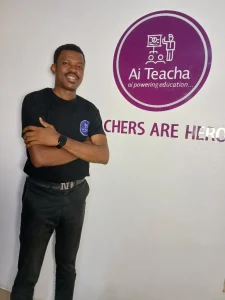
Akpan Emmanuel is the Co-founder and Executive Director of International Community for Educational Technology -ICEDT makers of Ai Teacha. He is an Education Technology Consultant, a Microsoft Innovative Educator Master Trainer and a Microsoft Innovative Educator Expert.He is a Global Teacher and a facilitator for Global Project – a UN Project on SDGs. He supervises classrooms from US, Canada, UK, India and Greece teaching SDGs.
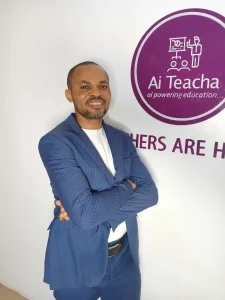
-

 Afripreneur9 hours ago
Afripreneur9 hours agoRedefining Real Estate Marketing: An Interview with Imelda Usoro Olaoye, Founder of Thinkmint
-

 Afripreneur8 hours ago
Afripreneur8 hours agoOluchi Anoruo on building SmartPharm and addressing access to healthcare products
-

 Economy13 hours ago
Economy13 hours agoMeta Hosts its First Youth Summit in Nigeria to Drive Innovation and Empowerment
-

 Technology13 hours ago
Technology13 hours agoLG’s Brand Reinvention: A Global Success Story








